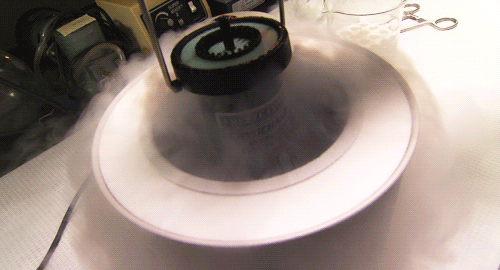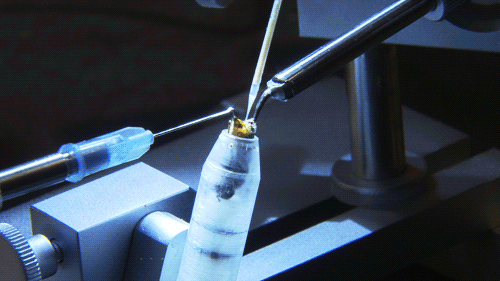U.S. scientists work to save the bee population and America’s food
On this week’s “TechKnow,” contributor and science writer Kyle Hill travels to Minnesota and Washington to explore the phenomenon known as “colony collapse” and the devastating effects that the loss of honey bees could have on the American food industry.
“The losses are really astronomical,” says Steve Ellis, a beekeeper from Barrett, Minn. “Last winter I lost 65 percent of my operation.”
Ellis is one of many beekeepers who has made his living in the commercial bee industry, raising colonies for honey as well as to rent out to commercial food growers to help pollinate their crops. He is also one of many beekeepers who have begun to see large-scale deaths and disappearances among his bee population.
Honey bees are incredibly important to the U.S. food supply, of which about one-third relies on bees for pollination. They also provide over $15 billion in revenue for the agriculture industry.
“The demand for insect-pollinated crops—the nuts, the fruits, the vegetable— is very much increasing,” Ellis tells Hill. “The supply of bees is very much decreasing.”
The term scientists use to explain the massive bee deaths and disappearances that are starting to become common across the country is “colony collapse disorder.” Colony collapse has been observed before, but beekeepers claim that it was nothing like the mass disappearances and deaths that they are now seeing in their colonies.
As our colleagues at Al Jazeera America have reported, a pesticide class known as nenicotinoids may account for some of the deaths, though diseases and parasites could also impact bees’ feeding and health.
For this reason, scientists have focused instead on creating a better bee, using artificial insemination to genetically engineer a stronger, healthier bee that can fight off colony collapse.
Susan Cobey works with a team of researchers from Washington State University who are using genetic engineering to try and create better bees. After years spent studying bees, she knows first-hand how hard it is to pinpoint and stave off the causes of colony collapse.
“There’s lots of different aspects to it,” Cobey says. “You have to look at the environment, exposure to pesticides, malnutrition due to lack of forage for the bees, pests, parasites, and pathogens.”
At her organic farm on Whidbey Island in Washington’s Puget Sound, Cobey raises drone bees that can survive harsh hive conditions. She extracts semen from the drones and fertilizes queen bees in the hopes that the resulting offspring share an enhanced combination of their resilient parent DNA.
“With instrumental insemination, I can do things that don’t happen in nature,” Cobey explains. “I’m trying to enhance what Mother Nature does.”
What does a rig for inseminating a queen bee look like? Rather surgical @ajam @AJTechKnow pic.twitter.com/LvDnYjzDRm
— Kyle Hill (@Sci_Phile) August 29, 2013
“The more drones [the queen] mates with, the more diversity and the better fitness you have,” Cobey tells Hill. “The goal now is to have gentle, productive bees, but now I also want bees that are resistant to all these pests and problems we have, which is a tall order. I will spend probably the rest of my life trying to do that.”
At the Smoot Hill Reserve in Pullman, Washington, more Washington State researchers are collecting and breeding honey bee samples from around the world. By pioneering technology that allowed them to cryogenically freeze honey bee sperm samples, the scientists are able to catalogue samples spanning the distance of the globe as well as a few decades. They have essentially created the world’s first bee sperm bank.

Bee semen being cryogenically frozen for storage.
“Before we developed this technique, it basically didn’t work,” scientist and Washington State student Brandon Hopkins explains to Hill. “Nobody in the world was able to freeze honey bee semen. It’s a very extreme environment for these cells to be put through. If it’s not done just right, it’s going to be useless.”
After the semen is safely frozen, it can be stored for years or utilized at Smoot Hill in what entomologist Walter Sheppard describes to Hill as “isolated mating stations,” individualized colonies that allow researchers to control the mating and specify the genetics that combine to form each new generation.
“We can put colonies here that have the particulars males that we want for the mating,” Sheppard tells Hill. “We have virgin queens here that have been produced from crosses that we’ve made using the frozen semen.”

A queen bee is carefully inseminated with drone bee semen.
Cobey, Sheppard, and their fellow researchers are working to increase the health of bee populations before colony collapse takes it’s toll on the American food industry. Beekeepers like Ellis are certainly already aware of the potentially dire consequences of continued honey bee loss.
“We have reached a disaster point, from a beekeeping industry standpoint,” Ellis concludes. “It just needs to be understood by the people of the country that we have a Deepwater Horizon occurring with pollinators and we need to deal with it.”
Watch "TechKnow," Sundays at 7:30PM ET/4:30PM PT on Al Jazeera America.





Error
Sorry, your comment was not saved due to a technical problem. Please try again later or using a different browser.